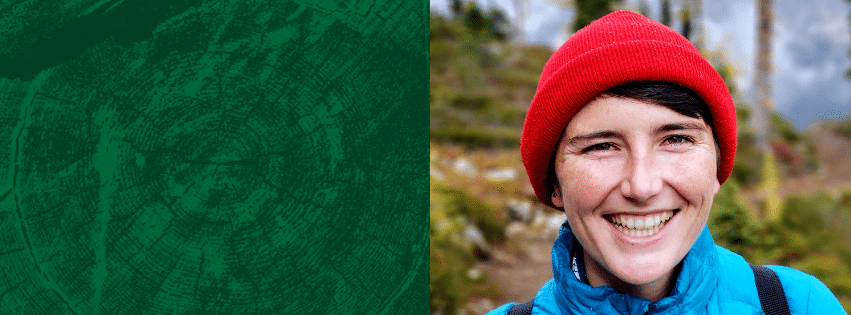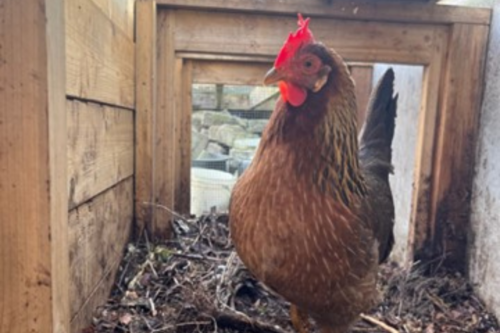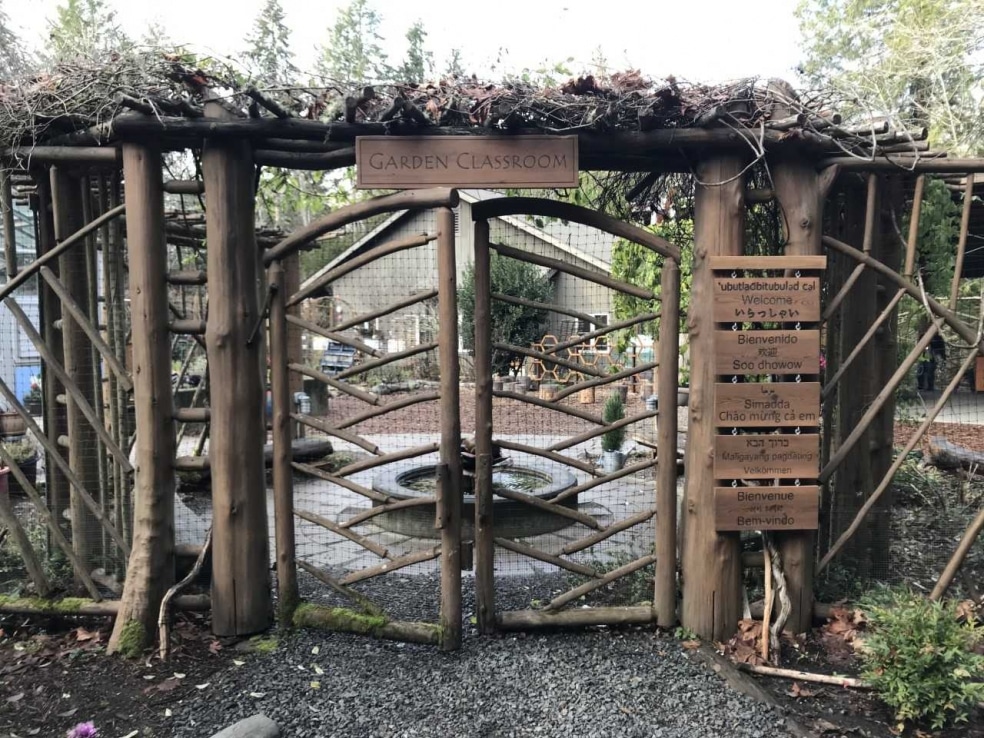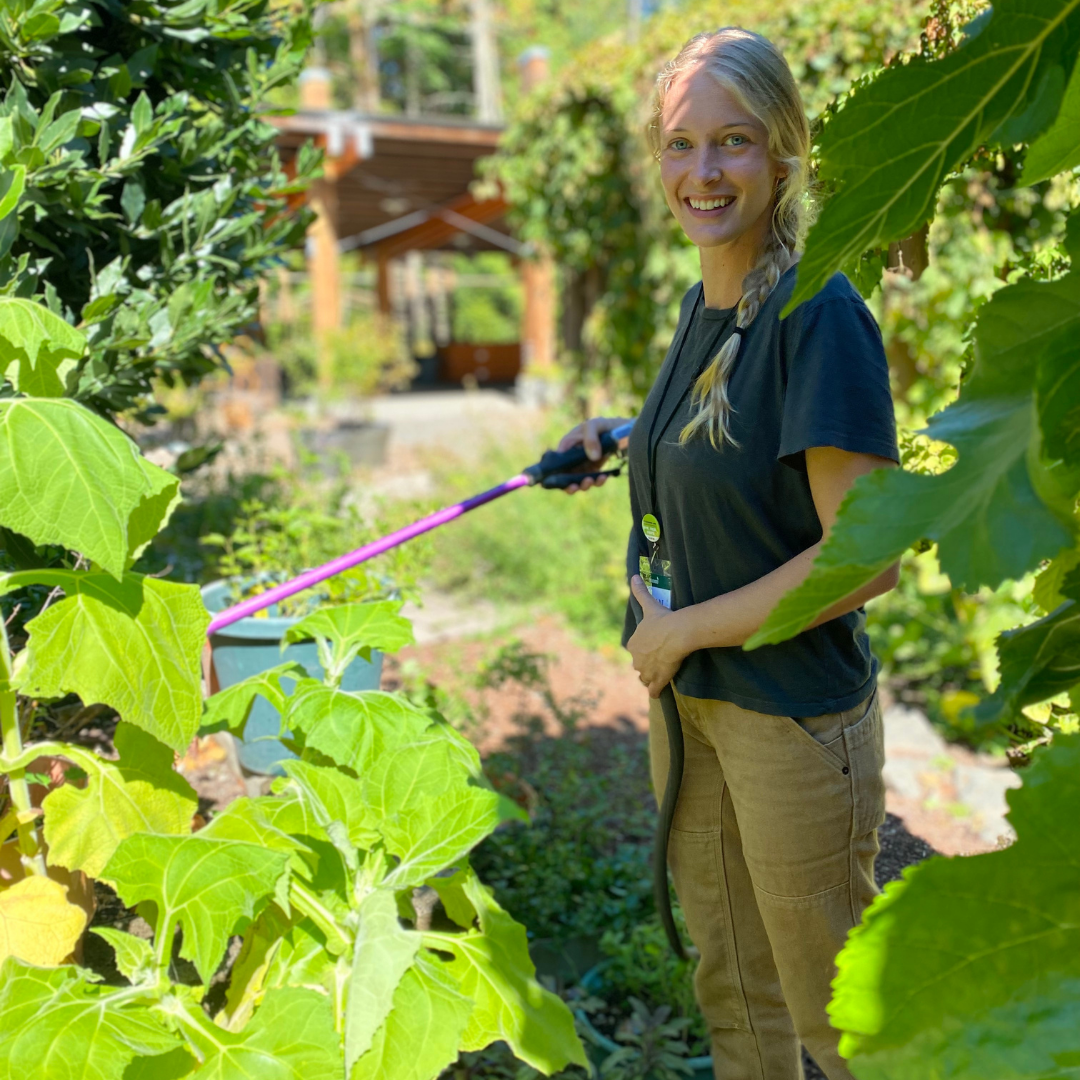February brings a new chapter to the IslandWood garden!
Author: Tamar Kupiec
Mónica Mesquita came to IslandWood because she wanted to learn how to be a better educator. Students in our Education for Environment and Community Graduate Program (EEC) spend alternating weeks teaching fourth and fifth graders in the School Overnight Program, while completing coursework in ecology, instructional methods, and the philosophy of education. Certainly, she acquired the experience and techniques that would help her answer the “how?” of teaching, but it was another question entirely that dominated her thoughts during the ten-month residential program. The question was “why?”
Born and raised in Portugal, Mónica earned an undergraduate degree in primary education at the University of Aberdeen, Scotland, and taught at an elementary school in Edinburgh. Her university training focused on mastering the tasks of teaching and controlling the learning process. At IslandWood, she learned to relinquish this control, to recognize “teachable moments” and follow their lead. The 250-acre campus, with its diverse ecosystems, a garden, laboratories, and treehouses to both shelter and delight the students, is a near-fantasy classroom for an environmental educator. But even in this land of plenty, when recalling IslandWood, Mónica focuses on its intellectual space—the conversation with faculty and peers that pushed her to think about why she chose to do this work.
Like many of her colleagues, Mónica says she wants to educate for a “better world.” The platitude, heartfelt as it is, makes her laugh self-consciously. But it’s the part that comes next, the part that became increasingly apparent during her time at IslandWood, that defines her vision. As someone who since childhood “has found meaning in contributing,” she wants to shift the focus away from the individual and toward community. “We’re not taught to believe that we belong to one another,” she says. “What happens when we start to think that way and what happens when we try to practice that in schools?”
Her instructor, John Haskin “offered a platform to think deeply and critically of environmental education,” says Mónica, “…about what we’re doing, and I think that’s what’s special, that the educators here are thinking, ‘How can we change the course of environmental education?’” Was teaching at a place like IslandWood, and environmental education more generally, too exclusive? she wondered. Whose stories about the land were being told? With these and other questions, her understanding deepened, but her faith began to falter.
After EEC, grads have three options: they can leave with a certificate or continue on to the University of Washington to earn either a master’s degree in teaching or in education. Since she already had her credentials, Mónica chose the latter. She arrived at UW, a confident, skilled, and reflective educator, still asking these essential questions. She thrived within the academic rigor and freedom of UW, where she explored other disciplines and studied with faculty who are also researchers. The theoretical exploration was heady, for sure, but she had the visceral experience of teaching in the School Overnight Program in which to ground it.
Mónica was introduced to queer pedagogy in a class called “Queer Desires,” and with this discovery, her motivation to teach was revitalized. She had come to see environmental education as “a place where things are usually presented as natural in a way that’s exclusive or normal.” “But that’s not a true representation of nature,” she says. “Nature is so varied and behavior is so varied, and if we frame the way we present things in these spaces [with that awareness], we can really challenge so many conceptions around normalcy.” Queer pedagogy does just that—challenge the idea of normalcy and in doing so, undermine the systems that oppress those who deviate from it. Anyone, Mónica emphasizes, queer or not, can teach this way.
Her advisor, Jessica Thompson, Associate Professor in the College of Education, described Mónica’s exam paper, which scrutinizes environmental education through the lens of queer pedagogy , “as cutting edge theory-to-practice work.” “I believe she has always taken a critical perspective on education,” Jessica says, “but rather than just critique, her work clearly showed creative and productive reasoning about ways to move forward.”
At UW Mónica often thought about how she would do IslandWood differently. Having recently returned to campus as a garden educator in the School Overnight Program, she got that second chance. She finds herself teaching the same curriculum, but making small adjustments to frame the content so that it serves her larger aim of social justice. One approach is to teach students to learn from, rather than about nature. With this shift comes humility and the appreciation for and acceptance of all life—plant, animal, and human—at the core of queer pedagogy. Take “Secret of the Seed,” a beloved lesson among IslandWood graduate instructors. To determine how deep to plant a seed, students are told to place three one on top of the other on their “skinny” sides and measure this length with a finger. Mónica does not simply tell the students to use that finger to measure the proper depth as she once did. She tells them to listen. “If you listen closely to the seeds,” she says, “they’ll tell you how to plant them.” Listen—to nature and to one another. It is her refrain.
Mónica encourages her students to question how we know what we know, to be alert to the ways that knowledge can be constructed to support existing norms. Again, the shifts are subtle, the details small. Stinging nettle is plentiful in the spring, and the children harvest it to make pesto for potato gnocchi. Monica likes to share with her students Coast Salish wisdom, suggesting that the land knows to provide this nutritious nettle for its people after the scarcity of winter. A student once objected to the inclusion of such nonscientific beliefs and of the indigenous origin stories shared at evening gatherings. “Science is one way to make sense of the world,” she told this student. “I like it but there are so many other valuable ways of making sense of our world.”
Mónica has found her way, with science, yes, but also queer pedagogy and a commitment to community, both human and natural, cultivated at IslandWood.
Mónica is now a Garden Educator with IslandWood’s School Overnight Program.
Please note that this post was last updated on 6/5/2018. Some details, including job title or place of employment, may have changed since then.










